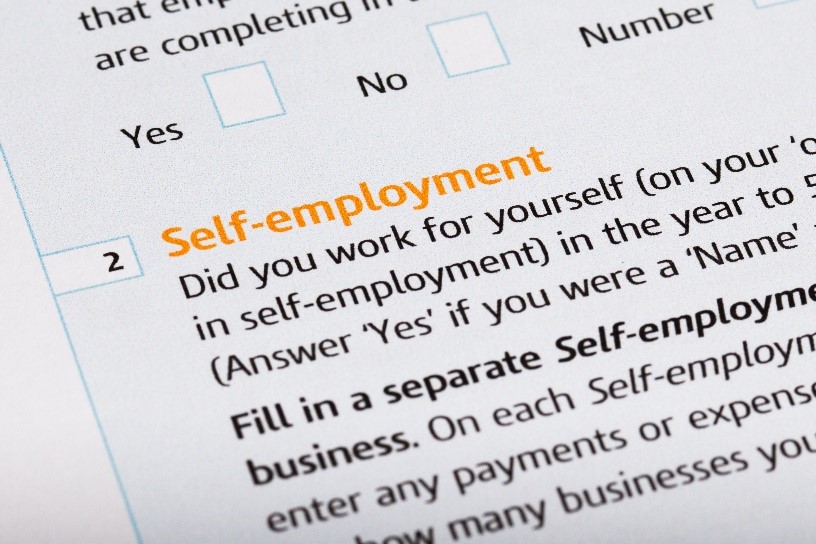IRS Shutters Some Operations, Self-Employed Get Unemployment and Track your Stimulus Check

IRS Shutters Some Operations, Self-Employed Get Unemployment and Track your Stimulus Check
“The IRS is unable to process paper tax returns, respond to paper correspondence or staff toll-free live service lines. Please use all electronic options available to you on IRS.gov or through your tax software provider.”
IRS shutters some operations, self-employed get unemployment and track your stimulus check.
Paper Tax Returns: All taxpayers should file electronically through their tax preparer, tax software provider or IRS Free File if possible. The IRS is not currently able to process individual paper tax returns. If you already have filed via paper but it has not yet been processed, do not file a second tax return or write to the IRS to inquire about the status of your return or your economic impact payment. Paper returns will be processed once processing centers are able to reopen. This year, more than 90% of taxpayers have filed electronically.
Comments from TaxMama.com:
1) A lot of taxpayers are unable to file electronically – for a variety of valid reasons. I understand why you cannot process paper tax returns – but this is very concerning.
2) Taxpayers who have not filed tax returns for a year or more and are trying to get back into the system cannot use the “get transcript system” – unless the IRS can provide some other way to verify their identity besides their AGI from a previous year.
3) The extension of time to file 2016 tax returns by July 15, 2020 and still get a refund is generous – but it won’t help people who don’t have their 2016 3rd party data. (Normally the 2016 filing deadline to get a refund is 3 years after the due date = April 15, 2020.)
This also means that those amended returns made available by the CARES Act for several retroactive tax breaks to 2018, and the Net Operating Loss (NOL) carrybacks are now, effectively not available.
NOLs that could be taken for losses before 12/31/17 could have been filed by July 27, 2020. But if you have to file on paper – well, that’s out. So, it only works if you can file Forms 1139 and 1045 electronically.
Essentially, it appears that Congress did not coordinate any of their generous provisions with the IRS and their capabilities – and all that was before the COVID19 shutdown of the IRS’s system. This also means that people who didn’t already file 2018 and prior tax returns might not be able to get their stimulus checks until they file their 2020 returns.
NOTE: This also affects payroll tax returns – which are filed on paper. Send them in on time (and save proof of the postmark if you can). SEND THE PAYMENTS (via EFTPS) regardless.
The EFTPS system is the only way to make electronic payroll tax payments. You cannot use pay.gov, though you might still be able to pay through your bank? If your business doesn’t already have an EFTPS account, set it up immediately. It can normally take up to two weeks to set up – hopefully, it won’t take longer.
Sent 04 14 2020 by GROCO Staff Writer
Dear Clients and Friends:
I want to alert you of new issues. Each day brings news of things I’ve never seen in 38 years of practice.
1) Self-Employed people are not able to claim Unemployment Benefits…Until Now.
https://www.edd.ca.gov/about_edd/coronavirus-2019/pandemic-unemployment-assistance.htm
Pandemic Unemployment Assistance
As part of the federal CARES Act, the new Pandemic Unemployment Assistance (PUA) program helps unemployed Californians who are business owners, self-employed, independent contractors, have limited work history, and others not usually eligible for regular state UI benefits who are out of business or services are significantly reduced as a direct result of the pandemic. The provisions of the program once operational include:
- Up to 39 weeks of benefits starting with weeks of unemployment beginning February 2, 2020, through the week ending December 31, 2020, depending on when you became directly impacted by the pandemic.
- An additional $600 to each PUA weekly benefit amount you may be eligible to receive, as part of the separate CARES Act Pandemic Additional Compensation program. Only the weeks of a claim between March 29 and July 31 are eligible for the extra $600 payments.
2) The IRS is pretty much closed, except the computers will keep running!
On April 9th, the IRS announced: https://www.irs.gov/newsroom/irs-urges-taxpayers-to-use-electronic-options-outlines-online-assistance
“To protect the public and employees, and in compliance with orders of local health authorities around the country, certain IRS services such as live assistance on telephones, processing paper tax returns and responding to correspondence are extremely limited or suspended until further notice. All Taxpayer Assistance Centers remain temporarily closed as are many volunteer tax preparation sites until further notice. This will not affect the IRS’s ability to deliver Economic Impact Payments, which taxpayers will begin receiving next week.”
- a)“The IRS is not currently able to process individual paper tax returns. Paper returns will be processed once processing centers are able to reopen.”
- b) “Taxpayers who mail correspondence to the IRS during this period should expect to wait longer than usual for a response. Once normal operations resume it will take the IRS time to work through any correspondence backlog. Correspondence sent to IRS offices may be returned to the taxpayer if that office is closed and no one is available to accept them.”
- c) The system to accept faxed-in Powers of Attorney is shut down.
- d) The IRS’s National Distribution Center is closed, so you can’t order paper forms.
- e) The Automated Phone System will stay open, BUT, “IRS phone lines supported by customer service representatives for both taxpayers and tax professionals are not staffed at this time.”
- f) “Taxpayer Protection Program:If you received correspondence from the IRS asking if you filed a suspicious tax return, you may use the online Identity Verification Serviceto validate your identity. Because the IRS cannot take calls or appointments right now, this is the only present option and is only for taxpayers who receive IRS letters asking them to authenticate their identity via online, telephone or in-person and confirm whether they filed the tax return in question.” (Commentary: This is a problem, because often these issues can’t get sorted out without a physical visit to an IRS office.)
3) IRS Field, Office and Correspondence Audits: Notice: IR-2020-59 of March 25, 2020
“During this period, the IRS will generally not start new field, office and correspondence examinations. We will continue to work refund claims where possible, without in-person contact. However, the IRS may start new examinations where deemed necessary to protect the government’s interest in preserving the applicable statute of limitations.
- In-Person Meetings – In-person meetings regarding current field, office and correspondence examinations will be suspended. Even though IRS examiners will not hold in-person meetings, they will continue their examinations remotely, where possible. To facilitate the progress of open examinations, taxpayers are encouraged to respond to any requests for information they already have received – or may receive – on all examination activity during this period if they are able to do so.
- Unique Situations – Particularly for some corporate and business taxpayers, the IRS understands that there may be instances where the taxpayers desire to begin an examination while people and records are available and respective staffs have capacity. In those instances when it’s in the best interest of both parties and appropriate personnel are available, the IRS may initiate activities to move forward with an examination — understanding that COVID-19 developments could later reduce activities for an agreed period.
- General Requests for Information – In addition to compliance activities and examinations, the IRS encourages taxpayers to respond to any other IRS correspondence requesting additional information during this time if possible. “
Sent 04 14 2020 by GROCO Staff Writer
In Arizona, Q1 Estimated Tax Payment are still due 4/15! Illinois may be the same, but this is not yet have confirmed.
https://azdor.gov/sites/default/files/PUBLICATION_GTN-20-1.pdf
Sent 04 15 2020 by GROCO Staff Writer
Dear Clients and Friends:
Economic Impact Payments: The IRS issued two Notices about them this morning.
For almost everyone, the computation and payment will be completely automatic, and there is no action required. Again, I hesitate to send this out, as most of our clients are above the income limits and will receive NO payment.
See the income limits below.
There are a few obscure situations where a taxpayer may want to give the IRS additional information, like in the rare case a person who does not file a tax return, because their income is just Social Security Payments and small pension payments, BUT they are supporting a child…so the IRS does not know about the child since you filed no tax return (legally)… therefore, if you want the extra $500 per child Economic Impact Payment, you have to go to https://www.irs.gov/coronavirus/non-filers-enter-payment-info-here to let the IRS have that information.
Status:
For those of you who want to get the status of your Economic Impact Payment…here is the new IRS site to do so. Some people get addicted to stuff like this and want to check the status of their payment every day …so, go crazy, if you like!
https://www.irs.gov/coronavirus/get-my-payment
I tried it this morning, and did not get in.
“Please Wait
Due to high demand, you may have to wait longer than usual to access this site. We appreciate your patience.”
If you want to go to this site to enter direct deposit information the IRS does not already have for the tax returns filed in prior years, you can, and that may speed up your receipt of the payment if you qualify. It may be too late. The IRS always takes 30 or 60 days to process most things, so you may get a paper check instead, at this point, no matter what you do, if they don’t already have your direct deposit information.
From the IRS:
“With an initial round of more than 80 million Economic Impact Payments starting to hit bank accounts over the weekend and throughout this week, this new tool will help address key common questions.”
IR-2020-72 April 15, 2020
Available only on IRS.gov, the online application is safe and secure to use. Taxpayers only need a few pieces of information to quickly obtain the status of their payment and, where needed, provide their bank account information. Having a copy of their most recent tax return can help speed the process.
- For taxpayers to track the status of their payment, this feature will show taxpayers the payment amount, scheduled delivery date by direct deposit or paper check and if a payment hasn’t been scheduled. They will need to enter basic information including:
- Social Security number
- Date of birth, and
- mailing address used on their tax return.
- Taxpayers needing to add their bank account information to speed receipt of their payment will also need to provide the following additional information:
- Their Adjusted Gross Income from their most recent tax return submitted, either 2019 or 2018
- The refund or amount owed from their latest filed tax return
- Bank account type, account and routing numbers
Get My Payment cannot update bank account information after an Economic Impact Payment has been scheduled for delivery. To help protect against potential fraud, the tool also does not allow people to change bank account information already on file with the IRS.
Here are the limits on who will get a payment. “The phase out limits are increased if you have dependent children.
U.S. residents will receive the Economic Impact Payment of $1,200 for individual or head of household filers, and $2,400 for married filing jointly if they are not a dependent of another taxpayer and have a work eligible Social Security number with adjusted gross income up to:
- $75,000 for individuals
- $112,500 for head of household filers and
- $150,000 for married couples filing joint returns
Taxpayers will receive a reduced payment if their AGI is between:
- $75,000 and $99,000 if their filing status was single or married filing separately
- 112,500 and $136,500 for head of household
- $150,000 and $198,000 if their filing status was married filing jointly
The amount of the reduced payment will be based upon the taxpayers specific adjusted gross income.
Eligible retirees and recipients of Social Security, Railroad Retirement, disability or veterans’ benefits as well as taxpayers who do not make enough money to normally have to file a tax return will receive a payment. This also includes those who have no income, as well as those whose income comes entirely from certain benefit programs, such as Supplemental Security Income benefits.
Retirees who receive either Social Security retirement or Railroad Retirement benefits will also receive payments automatically.”
Again, we realize this may not apply to most of you.
We hope you found this article about IRS shutters some operations, self-employed get unemployment and track your stimulus check helpful. If you have questions or need expert tax or family office advice that’s refreshingly objective (we never sell investments), please contact us or visit our Family office page or our website at www.GROCO.com. Unfortunately, we no longer give advice to other tax professionals gratis.
To receive our free newsletter, contact us here.
Subscribe to our YouTube Channel for more updates.
Considerately yours,
GROCO, GROCO Tax, GROCO Technology, GROCO Advisory Services, GROCO Consulting Services, GROCO Relationship Services, GROCO Consulting/Advisory Services, GROCO Family Office Wealth, and GROCO Family Office Services.
Taxpayers Have Until April 17 to File and Pay
Taxpayers Have Until April 17 to File and Pay Taxpayers across the nation will have until Tuesday, April 17, 2007, to file their 2006 returns and pay any taxes due, the Internal Revenue Service announced today. Taxpayers will have extra time to file and pay because April 15 falls on a Sunday in 2007, and…
IRS FIN 48
IRS FIN 48 Background As a result of the impending effective date for the application of Financial Accounting Standard Board Interpretation No. 48, Accounting for Uncertainty in Income Taxes, of FASB Statement 109 (FIN 48), some taxpayers may wish to request a greatly accelerated examination and resolution before the end of their current financial statement…
Where Should You Retire if You’re Wealthy?
Where Should You Retire if You’re Wealthy? Best Places Retire in USA if You’re Wealthy You’ve spent your lifetime accumulating wealth through your employment and other business endeavors. You have been successful at what you do and now the time has finally come when you’re ready to ride off into the sunset, so-to-speak. It’s time for…
Automatic Penalties for Late Form 5471s and Related Forms
Automatic Penalties for Late Form 5471s and Related Forms On January 1, 2009, the IRS will begin to automatically assess section 6038 penalties for each late-filed Form 5471, Information Return of U.S. Persons With Respect to Certain Foreign Corporations, and late filing penalties under section 6651 for related forms. IRS is now sending out letters…




